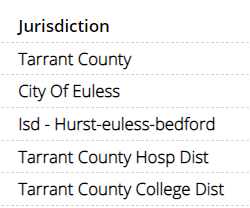The Lost City…Do You Know What City Your Property Is In?
The Dallas-Fort Worth metroplex is one of the fastest growing metropolitan areas in the nation. This tremendous growth means that what used to be small towns are now thriving suburbs. Small communities that at one point seemed miles apart are now literally on top of one another. Tarrant, Rockwall, Denton, and Collin County appear to be major hot bed of this tremendous growth. This growth also means that these small communities are now becoming incorporated and are creating city taxing authorities to provide city services for those citizens who live in these communities.
With these communities being so close together, it may be difficult to determine what city the property is actually located in. There are some great resources to help listing agents make this determination.
First, ask for the property tax bill that the Seller receives. The tax billing statement will help you, as the listing agent, see what taxes the property is subject to. PRO TIP – the property tax bill will give you the Tax ID# that you will need when you enter the listing into the MLS.
The second resource is the County Appraisal District (CAD) website. After locating the property address on the CAD, there will be an area labeled “entities” or “jurisdictions”. The example below if from the Collin County CAD. In this example, this property is being taxed by the City of McKinney.

This is great information since it not only give you the list of taxing entities, but also the tax rate that is assessed for each entity.
The third resource will be the REALIST Tax within Matrix. REALIST Tax is a product of Corelogic. Corelogic purchases the tax records from all counties within Texas. In REALIST Tax, the taxing authorities are listed under the section labeled “Jurisdiction”. The example below is from REALIST Tax for a property located in Tarrant County. In this example, the property is taxed by the City of Euless.

With this information in hand, you will use the City taxing authority listed as either the “Taxing Entity” or “Taxing Jurisdiction” as you enter the listing into the MLS. The mailing address in some cases may be deceiving. The city listed in the mailing address simply means that city is where the nearest post office is located that delivers mail to that address. The city listed as the mailing address has no bearing on the city taxing authority.
Why is ensuring the correct city is entered for the property in the MLS so important? Tax rates and city services are the key factors. For example, there are many properties located in the Keller ISD that even have Keller mailing addresses. However, many of these properties are actually located in the City of Fort Worth. The City of Keller tax rate is .395. The City of Fort Worth tax rate is .7325. Imagine claiming Keller as the city on a listing in the MLS that is actually in the city of Fort Worth. With double the tax rate between the two cities, who do you imagine might be stuck paying the difference??? City services are also affected by the city taxing authority. Some people may expect that they can join the senior center or go to the city water park and pay the resident rate. That would not be the case if you are not paying city taxes.
The Listing Data Checker System will flag listings that do not have the correct city listed. Through the MLS enforcement process, if the incorrect city is listed on a property, the listing agent will be required to update the city to the city that has taxing authority over the property.
Lastly, as REALTORS® and MLS Participants/Subscribers you have promised to provide accurate and complete information about your listed properties. You have an obligation to other REALTORS® and MLS Participants/Subscribers AND consumers to provide the most accurate data.
If you ever have questions about this or any other MLS policy, please feel free to reach out to the MLS Team at 214-540-2755 or via email at mls@dfwre.com.